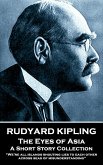In "The Eyes of Asia," Rudyard Kipling intricately weaves a collection of vivid narratives that explore the complex cultural and social landscapes of Asia. Through a series of interlinked stories, Kipling showcases his trademark prose, rich with evocative imagery and deep characterizations. The literary style reflects the multicultural context of the late 19th and early 20th centuries, as Kipling draws upon his experiences in British India, presenting an authentic glimpse into the lives of its diverse inhabitants, while simultaneously grappling with the tensions of colonialism and personal identity. Rudyard Kipling, an acclaimed poet and novelist, was immersed in the geopolitical tapestry of British colonial rule during his formative years in India. His diverse upbringing and unique experiences in the region profoundly influenced his writing, leading him to explore themes of cultural intersection and imperialism. Kipling's own complex relationship with British rule lends depth to the stories, offering a nuanced perspective on the consequences of colonial ambitions and the contrasting realities of Asian societies. For readers seeking a thought-provoking exploration of Asia through Kipling's discerning gaze, "The Eyes of Asia" is a must-read. This collection not only enriches our understanding of historical contexts but also invites reflection on the enduring legacies of colonialism. Readers will appreciate Kipling's masterful storytelling, which remains relevant in our contemporary discussions on culture and identity.
Dieser Download kann aus rechtlichen Gründen nur mit Rechnungsadresse in A, B, BG, CY, CZ, D, DK, EW, E, FIN, F, GR, H, IRL, I, LT, L, LR, M, NL, PL, P, R, S, SLO, SK ausgeliefert werden.
Hinweis: Dieser Artikel kann nur an eine deutsche Lieferadresse ausgeliefert werden.










